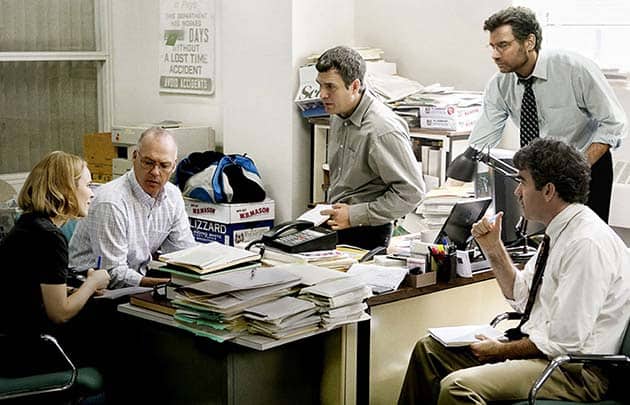“This is how it happens isn’t it? … A guy leans on a guy, and suddenly the whole town just looks the other way”.
The film Spotlight is a true story about the Boston Globe newspaper’s investigative reporting team Spotlight, and its campaign in 2001 to uncover widespread, systemic child abuse by Catholic priests in Massachusetts.
They team find evidence of a church hierarchy systematically moving paedophile priests between parishes and schools, setting up undisclosed “treatment centres” for them in suburban streets, and paying victims paltry amounts of compensation and binding them to silence.
By the end of their investigation, the team have found that at least 87 priests within Boston alone have abused children. The now-adult victims are dealing with trauma; many driven to drugs or to suicide.
Cover up
“If it takes a village to raise a child, it takes a village to abuse them”, says Mitchell Garabedian, the lawyer who represents abuse victims. He is referring to the collaboration of the church and the local courts, who worked together to keep evidence documents sealed when they should have been public.
The police, too, had received reports of abuse for decades without making them public, or even recording them in some cases.
This scenario has played out all over the world, where institutions of the state have systematically colluded with the clergy to conceal abuse. A list of a staggering 209 cities and towns, where similar scandals have thus far been uncovered, is shown at the end of the film.
None of this is unfamiliar in Australia now. The Royal Commission into Institutional Responses to Child Sex Abuse was established in 2013, after years of resistance from the Church and other authorities. It was partially sparked by an investigation by journalist Joanne McCarthy into the rampant abuse within the Maitland-Newcastle Archdiocese.
Church institutions in numerous other places around the country, including Sydney, Melbourne, Hobart, Ballarat and Wollongong, have since been implicated.
In every place the evidence shows that members of the police and other authorities were aware of what was happening.
It also shows the way the Church deals with those who do their dirty work. Boston Cardinal Bernard Law, shown in the film, was made archpriest of a Basilica within the Vatican itself after Spotlight’s investigation.
Why has the Church been allowed to get away with this level of abuse in so many places?
Common interests
In a scene at a Catholic Charity fundraiser ball, members of the Boston elite, including the Boston Globe editors, rub shoulders with the Catholic clergy. This reflects the reality in cities across the world where the Church holds any power. Politicians, police chiefs, big business owners and judges move in the same powerful circles as the clergy.
The Catholic Church itself is also extremely wealthy. It has investments in businesses and owns vast tracts of property around the world. The Church hierarchy is very much a part of the ruling class.
The state and the clergy share an interest in maintaining the status quo and in keeping poor and working class people obedient and submissive, in order to preserve their own power.
Community and control
In Boston, the Catholic Church permeates the life of the community and provides a significant amount of social welfare, which the state relies on.
“We can’t throw out all of the good he’s ([he Cardinal] doing over a few bad apples”, says one school superintendent who’s trying to justify his turning a blind eye.
The Church also provides people a kind of solace and support. At the same time it teaches people to obey and not to speak out against authority, whether before the pulpit or at work. It works as an agent of social control that suits the state.
The Church’s role in the community means priests can easily take advantage of the people in their care, and maltreatment becomes a means of exerting power. This situation is greatly exacerbated by the Church’s obsession with sexual restraint and control. The victims are most often vulnerable, poor children, who are dependent on the Church for their survival.
Spotlight is a well-made, gripping film that may add something more to the growing crisis within the Catholic Church internationally.
By Caitlin Doyle
Spotlight
Directed by Tom McCarthy
In cinemas now






